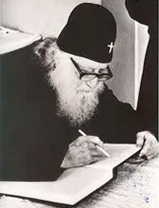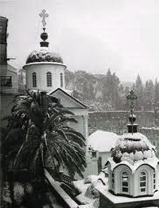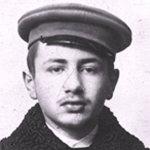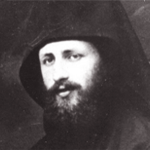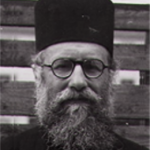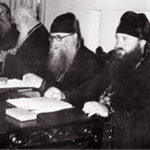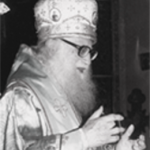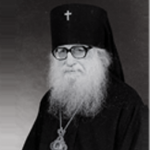A report given at the Liturgical Conference at the St. Sergius Theological Institute, Paris, on July 2, 1975
The aim of this report is not to examine in detail the historical evolution of the forms of Divine services, the origin of specific differences between Greeks and Russians, the significance of the different Typikons in this process, nor their mutual influences, etc. I am not a liturgist and will not be doing this systematically. I will limit myself to several remarks and observations, more of a personal nature, about how the Liturgy and other services are celebrated in Greek churches on the one hand, and in Russian churches on the other. In speaking of churches that use Greek I am not forgetting that Athos did not adopt the 1838 reforms of Constantinople and remained faithful to the more ancient Typikons. In this report, I am interested not only in one or another textual variant or a difference in the rubrics, but first of all in the significance and meaning, which the same words or the same liturgical actions might have in the consciousness of the faithful, how it can be reflected in their religious conduct, even if such differences are frequently based on misunderstandings. These «liturgical variations» can be found interesting for understanding and evaluation of these peculiarities of popular piety.
We will begin with some more or less ordinary observations in the differences in celebrating the Divine Liturgy. It must be noted that the biggest differences between the Greeks and the Russians in their celebrations are somewhat indirectly related to our topic since they occur in the so-called «secret» prayers, which are not discernable to the majority of the laity and thus have no direct influence upon their conduct. Nonetheless we will speak about them since these prayers constitute the more important part of the Liturgy and the clergy who pronounce them likewise make up a part of the People of God. Setting aside for the moment what precedes the Liturgy itself (Great Doxology for the Greeks, the Hours for the Russians, as well as the Proskomide), we will make note of a more substantial and characteristic difference in the Liturgy of the Catechumens.
Following the 1838 reform, the Greeks (except the Athonite monks who kept the old order) replaced Psalms 102/103 («Bless the Lord, O my soul») and 145/146 («Praise the Lord, O my soul») as well as the Beatitudes, which follow, by antiphons, i. e. brief appeals to the Theotokos or to Christ, Who is risen and is praised in His saints. The Russians continue to sing, each Sunday, the two noted psalms and the Beatitudes. They are replaced by antiphons only at great feasts or on weekdays. The dropping of the psalms and the Beatitudes has the advantage (if it can actually be considered the advantage) of shortening the Divine Liturgy. However, it pays to regretfully note that the Liturgy of the Catechumens thus loses its didactic and Biblical character, both Old and New Testamentary, which must be a part of it. The same can be said about the 1838 reform’s deletion of the prayers for the catechumens. It becomes unclear why the first part of the Liturgy continues to be called «Liturgy of the Catechumens.» We will note that the Athonite Greek monks continue to pray for the catechumens during Liturgy throughout the whole year.
Another feature, which we will note, occurs during the Liturgy of the Faithful, during the Cherubic Hymn. Here the differences in behavior become noticeable immediately. When the hymn begins, the Greeks have the habit of sitting down while the Russians love to kneel. Then, when the Great Entrance with the Holy Gifts begins, the Greeks stand and remain standing, bowing their heads, while the Russians rise from their knees and stand straight (but not all, some make a full prostration. These are those who think that the Holy Gifts have already been sanctified — a heresy condemned in Moscow in the 17th century). It can be said that for the Greeks, the entrance itself and the commemorations are more important while for the Russians it is the Cherubic Hymn. Nothing in this practice, of course, is prescribed by the Russian Church. On the contrary, a lot has been done, especially in recent times, to explain to the faithful that it is not proper to kneel during the Cherubic Hymn, especially on Sundays, inasmuch as the Gifts have not been sanctified. Nonetheless all these efforts had little effect, so entrenched is the dangerous spiritual tradition, expressed by this practice, of making something «mystical» out of the Cherubic Hymn, the «profound center» of the Divine Liturgy, to the detriment of the Eucharistic Canon and the changing of the Holy Gifts. As for the Greeks, their practice may have an historical explanation since the Cherubic Hymn was introduced into the Liturgy very late, only in the 6th century, in Constantinople. Its primary intended purpose was to fill the silence resulting from the commemoration of the living and the dead at the table of oblation just prior to the Great Entrance. (Incidentally, the introduction of the Cherubic Hymn was subject to contemporary criticism as a strange innovation.) Thus, since the Cherubic Hymn is simply a «filler,» it is understandable that the Greeks listen to it while sitting, as is customary during similar moments.
The same can be said about one of the first phrases of the Eucharistic Canon. It is read differently, at least in our time, by the Greeks and the Russians: ’Elaion eirhnhz, Qusian ainesewz, which means «Oil of peace, sacrifice of praise» (in Greek) and «Mercy of peace, sacrifice of praise» (in Russian). It is obvious that this is the result of orthographic confusion that occurred in Greek manuscripts between the two words, which in Byzantine Greek, although written differently, were pronounced identically (although with different endings: elaion — oil and eleos — mercy). Similar confusions, called «iotacisms,» occur very frequently. It is almost a certainty that the form elaion (oil) is the original and primary one, while eleos (mercy) is erroneous or more likely, a willful new introduction by a copyist who wanted to «enhance» the text. Here we see a classical example of the evolution of a literal Biblical text into a symbolic and a spiritualized one. This is the most unlikely case of a «reversed» evolution — from a simple to a complex. Russian copyists and liturgists preferred the spiritualized form (mercy and not oil) and adapted it to the Slavonic Liturgy. However, it would be a mistake to think that it is precisely the Slavonic copyists to whom the «honor» of such «enhancement» belongs. This first occurred among the Greeks, and the witness to this is that Nicholas Cabasilas is well aware of this in his «A Commentary on the Divine Liturgy» (14th century). Although he does not literally cite this passage but paraphrases it, his paraphrase shows that he reads it as «mercy» and not «oil.» This becomes more evident in the following passage: «We offer mercy,» Cabasilas says, «to Him Who said: I will have mercy and not sacrifice… We also offer the sacrifice of praise» (P. G. 150, 396 AB).
It is important to note that among the Greeks, this «spiritualized» variant did not last; they remained faithful to the Biblical text while for Russians, the «mercy of peace» variant became one of the high points of the Liturgy for many people, and many great composers wrote settings for it, which increased its appeal for people who come to church to hear beautiful singing.
Another example of an expansion of a brief text, but in this case a purely theological one, was likewise motivated by the need to give the priest more time to read the first secret prayer of the Anaphora. The brief exclamation (by the cantor among the Greeks) «It is meet and right» (in response to the priest’s «Let us give thanks to the Lord») is replaced in the Russian Liturgy by a longer phrase sung by the choir: «It is meet and right to worship the Father, and the Son, and the Holy Spirit: the Trinity, one in essence, and undivided.» (As in the case of «mercy of peace,» the Russians adopted a variant already found in Greek manuscripts but not preserved in the liturgical tradition). The shortcoming of this theological dissemination can be seen in its lack of continuity since the choir’s response does not accurately follow the words of the celebrant («Let us give thanks to the Lord» — «It is meet and right») but is replaced by an instruction for venerating the Holy Trinity. But on the other hand, since there is no time for the celebrant to read the first Eucharistic Prayer during the brief response by the cantor, an outrageous practice arose among today’s Greeks. During a concelebration, the second priest interrupts the first celebrant (even if he is the bishop) who is unable to complete the secret prayer during the response of the cantor, with a loud exclamation: «Singing the triumphant hymn, shouting, proclaiming, and sayingю» (All this to prevent pauses, which the Orthodox dislike.) Fortunately, the faithful who remain outside of the altar are unaware of any of this since the Eucharistic Prayers are read quietly.
The same can be said about all of the Eucharistic Prayers, but we will only speak of it briefly here. These are things, which are well known.
A uniqueness in the Eucharistic Canon of St. John Chrysostom among the Russians is in the insertion into the Epiklesis of the troparion to the Holy Spirit, taken from the Third Hour, which is relatively ancient, and which is supplemented by verses from the Psalm 50/51. It needs to be noted again that the authors of this interpolation were not Russians, since it can be found in some of the Greek liturgical manuscripts of the 11th century. However, it spread widely among the Russians and, in the minds of many celebrants, is perceived to be the Epiklesis. (Many priests when speaking of the Epiklesis, have in mind precisely this interpolation. Its significance is enhanced by the dramatic rendition of these words, often accompanied by raised hands and arms, while the deacon, reciting the verses from the Psalm 50/51, lowers himself on one knee.) There is nothing that corresponds to this in the Greek Liturgy. Without a doubt, this interpolation (which could be called «the Epiklesis within the Epiklesis») adds a certain degree of individualism and piety to the priest’s spirituality, while it interrupts the sequence of the Eucharistic Canon. However, during the Liturgy of St. John Chrysostom, this is not done crudely, since the interpolation is placed between two phrases and not in the middle of one. It is entirely a different and a more serious problem in the Russian Church when we come to the Liturgy of St. Basil the Great. Here there is not just one but two different interpolations. The first one, just as in the Chrysostom Liturgy (troparion to the Holy Spirit), but with a greater difference, since it interrupts the first phrase of the Canon in the middle, following the verb in infinitive form, the aorist of anadeixai — «to show.» Thus, after this lengthy interpolation, the celebrant is almost forced to turn back, if he wants to continue the train of thought. The artificiality of this interpolation is much more evident here than in the Liturgy of St. John Chrysostom, from which, incidentally, it was taken. (It has no substantiation in any of the Greek manuscripts of the Liturgy of St. Basil the Great.)
But of greater importance is the second interpolation, metabalwn tw Pheumati sou tw ’Agiw — «making the change by Thy Holy Spirit,» which was inserted into the Slavonic text of the St. Basil’s Liturgy under the influence of the St. John Chrysostom text.
The least that can be said here, is the following:
1) This interpolation is an inadmissible grammatical error since the participle metabalon, in Greek, cannot follow the indefinite mood of anadeixai. In the Chrysostom Liturgy, it follows the imperative mood of metabalein («make»). It would be proper to use another indefinite mood of metabalein («and change»), but the interpolator preferred to slavishly follow the text that he copied.
2) This interpolation is redundant since St. Basil’s Anaphora already expressed the changing action of the Holy Spirit (calling upon Him) while in the Chrysostom Liturgy the petition is for His descent upon the Gifts, thus «changing» is added.
3) It creates a liturgical monstrosity of four blessings of the Eucharistic Gifts. In order to avoid this, contrary to all tradition, the third blessing is diminished (accompanied by the words «shed for the life of the world»).
All these distortions in the Russian celebration of St. Basil’s Liturgy rightfully generated criticism by Russian theologians.
Thus the noted church historian, Vasilii Bolotov [1854-1900], even wrote that one of the first tasks of a future council of the Russian Church would be to remove all these interpolations from St. Basil’s Liturgy, and first of all, the words «changing them by Thy Holy Spirit.» There have been several councils since that time, but unfortunately, nothing has been done. The reason appears to be clear: the fear of the Old Ritualists who would not hesitate to accuse the «Nikonian» Church of «innovations.» Another reason that can be added is the fear of the Russian Church of any liturgical changes, even those, which are perfectly justified. This is the conservative reflex on the part of the believers. Bearing in mind the unsuccessful liturgical reforms, which the Renovationists attempted to introduce into Russian Orthodoxy after the revolution, the least significant change in the services brings on the suspicion of a return to Renovationism. It can be said that the Renovationists with their revolutionary liturgical reforms have seriously impeded any attempted improvements in Russian Divine services for many decades. The pre-revolutionary order of Divine services became the sacrosanct ideal for the people.
Nonetheless, by the action of the Holy Spirit (which I firmly believe), two important new practices came into being in the liturgical life of the believers: a considerably more frequent reception of the Holy Gifts (when before the revolution people would normally receive Communion once a year) and congregational singing (and not by the choir alone as in the past) of the major parts of the Liturgy and other Divine services, particularly the Creed and the Our Father.
As for the Greeks, the Creed and the Our Father are read in various ways (but never sung) following an unquestionably more ancient tradition, when these were read by the non-celebrating bishops or priests or by respected older laymen. This commendable practice is often replaced in our time by another one, especially among Greeks living in the West. These prayers are read not by the oldest individuals present but by a boy or a girl, or are read together by the congregation (but are never sung). This practice has come from the West and is characteristic for ecumenical gatherings, but it is foreign in Orthodox Divine services.
Two differences could be noted in the Communion of the faithful among Greeks and Russians.
1) When the deacon comes through the Royal Doors with the chalice and calls the faithful to «draw near» — «in the fear of God and with faith,» today’s Greeks add «and love.» This is a beautiful addition, but it does not represent the ancient liturgical tradition, which, correctly reflecting the sacramental spiritual life of the Chrysostom liturgy, stresses the feeling of awe before the «great Mystery.» It can be noted with some certainty that the words «and love» were introduced in the 18th century on Athos by the advocates of frequent Communion, the representatives of the «Kollyvady» movement with the Venerable Nicodemus the Hagiorite at its head, and later accepted by the Constantinople Typikon of 1838. However, these words did not penetrate into Russia.
2) On the other hand, the Russian Church’s practice of having the laity kiss the Holy Cup after receiving Communion was not taken up by Greek popular piety. It views this as allowing the laity to do something that belongs exclusively to the clergy, namely, touching the sacred vessels.
We will note another innovation recently found among the Greeks under the influence of the «Zoe» movement: the clergy read the Anaphora prayers and consecrate the Holy Gifts while kneeling. This liturgical practice was subjected to sharp criticism by a number of theologians (among whom was Archpriest Georges Florovsky) for its anti-traditional character. On our part, we will limit ourselves to two comments: 1) The reading of the Anaphora while kneeling is contrary to the canons of the First Ecumenical Council, which categorically prohibits kneeling on Sundays, as well as between Easter and Pentecost and on other major feasts. 2) Celebrating the Anaphora while kneeling is physically difficult and inconvenient. If the altar table is high, it is difficult to make the sign of the cross over the Holy Gifts, and there is a danger in spilling the chalice. If it is low, then it is difficult to perform other parts of the Liturgy while standing. However, the fact that this is inconvenient and difficult contradicts the real spirit of the Divine service wherein everything is harmonious. Likewise, the attempt to outdo the piety of the Fathers is pretentious. They did not feel that it was necessary or pleasing to God to celebrate the Eucharist while kneeling.
From a theological and catechetical point of view, however, the most serious departure in the liturgical practices of Greeks and Russians is not to be found in the Eucharist but in its preparatory part, the Proskomide. I will set aside the question of the number of prosphori to use, be it one, five or even seven as with the Old Ritualists. This is not a substantial question. What is more important is that the Greeks, among the nine ranks of saints commemorated while removing particles from the prosphora, place the commemoration of the Archangels Michael and Gabriel and all the bodiless heavenly powers that is, the angels, before that of St. John the Forerunner. The Russians, however, do not commemorate the angels at the Proskomide at all and begin immediately with St. John the Forerunner. There is a serious theological problem behind these two differences in the liturgical practice: is the Redemption, the salvation through the Blood of Christ, His sacrifice on the Cross, related only to humanity, or does it include the angels, and does it have a cosmic significance? Is the Mystery of Christ’s Body and Blood, the Holy Eucharist, likewise intended for the angels who are bodiless? Finally, has the Fall of the human race been carried over to the angels, making them in need of redemption? These are the questions that arise from the commemoration of the angelic hosts. Some Russian theologians categorized this practice as heretical, but officially this question has not been touched upon by any of the Orthodox Churches. Historically, the list and the order of saints commemorated at the Liturgy have been established little by little. In some Greek manuscripts of the Byzantine era, the names of angels are included; in others they are not. However, in contrast to what is noted above, it is the Greeks who adopted the expanded form that includes the angels while the Russians excluded them from their liturgical practice, perhaps on the basis of the teachings of faith. Having no aim to decide this problem here, from the theological point of view, I would nonetheless say that the Russian practice expresses a more anthropocentric understanding of salvation while the Greeks place an emphasis on its cosmic dimension. Here one can show a parallel in the difference which occurs in the Slavonic and Greek texts of the celebrant’s exclamation at Matins before the «Praises»: «For all the powers of heaven praise Thee and to Thee they send up gloryю» as in the Greek text, while the Russians read «…and to Thee we send up glory: to the Father, and to the Son, and to the Holy Spirit, now and ever, and unto the ages of ages.»[1] As can be seen, the Slavonic text is more anthropocentric: it is not «the powers of heaven» but «we» who send up glory to the Holy Trinity.
***
More could be said about the liturgical differences in other services (Vespers, Matins, Hours, etc.) between the Greeks and Russians but, in order not to expand our presentation too much, we will note that at least in parish practice the main difference is that the Greeks celebrate Vespers in the evening, on the eve of Sundays and feasts, and begin the next day with Matins and go into the Liturgy immediately following the Great Doxology, thus omitting the Hours. The Russians, however, celebrate what they call «The All-night Vigil,» i. e. Vespers and Matins combined, which is not a service that lasts all night. On the following day, the Liturgy is preceded by the Hours.
It must be said that either of these liturgical practices have their advantages and disadvantages. The Greek one is more natural and is closer to the Typikon, since evening services are performed in the evening and the morning ones in the morning and not the other way around as with the Russians. But because Vespers is relatively brief, very few people come to church in Greek-speaking parishes, on the basis of the Orthodox mindset: there is no sense to come to church for a brief service. The longer the service the more reason there is to attend it. The Russian Vigil became a well-attended service even at the expense of the Liturgy, which is a matter of regret. The reason is a sentimental one: people like to pray in semidarkness, with the flickering of vigil lamps and candles. The Liturgy somehow tires people out with its spiritual intensiveness. It should be noted, however, that in recent times a reverse had taken place among the Russians living in the West. Under the influence of the heterodox environment, in which they live, and that false spirituality, which centers all piety to the Eucharist alone, they very rarely attend the Vigil and in this way deprive themselves of the spiritual and theological treasures that can be found in its hymnography.
We can also note with regret that today, except in the Mount Athos monasteries, the Psalter is read so infrequently. Thus, the reading and singing of Psalm 1 («Blessed is the man…»), which makes up one of the solemn moments in the Russian Vigil, has been completely eliminated from the Greek Vespers in spite of it being called for in the ancient Typikons. The same can be said for the dropping of the Hours in Greek parishes except for Great Lent.
Great Lent occupies the same central place in the liturgical year both among Greeks and Russians. However, those moments, which express popular piety, or, as can be said, a spiritual emphasis, at times are expressed very differently in the two traditions. If we take the first six weeks of Lent (we will speak of Passion Week later), we can say that among the Russians, one of the more characteristic and vibrant expressions of spiritual life is the prayer «O Lord and Master of my life…» Every Russian, even the infrequent churchgoer, is familiar with this prayer. For him, it marks off the beginning and end of the Lenten period. It specifically singles out the services of Great Lent from the others throughout the liturgical year. Its great popularity and profound influence upon spiritual life can be seen from Pushkin’s poem "Fathers of the desert and undefiled mothers…«[2] This was the poet’s favorite prayer. He was deeply moved hearing the prayer being read by the priest in church. And yet Pushkin was not a particularly religious person. Thus, the Russian believer will be seriously surprised and perhaps even incredulous when he learns that the prayer is factually unknown to the majority of the Greek Church people and that it is not heard in Greek churches during Lent.
I must explain something to avert some misunderstanding. In fact this prayer exists in Greek service books just as in Russian ones. It is not omitted. It is well known to the clergy, but since, according to the ancient Typikons, it is to be read quietly, «secretly,» the laity have completely forgotten it except for the prostrations that accompany it, which are characteristic for Great Lent. The Greek practice of reading the prayer «secretly» is undoubtedly more ancient. All Typikons, including the Russian ones, prescribe this (see for example the existing Russian Typikon’s direction for the beginning of Great Lent: «We do this interiorly» or in other places, «mentally,» or «secretly,» the prayer of Ephraim the Syrian «O Lord and Master»). The Russian practice of reading this prayer aloud is an innovation, introduced in the 15th or 16th centuries. Nonetheless, it remains in the people’s religious consciousness as one of the more beautiful Orthodox prayers, which, without this practice, could have become forgotten inasmuch as the «secret» or «mental» recitation of certain prayers could be spiritually profitable in monasteries, where the monks are well familiar with the Divine services, but in parishes, especially large ones, such a practice could lead to ignorance and to spiritual impoverishment.
Nothing like that could be said about the Great Canon of St. Andrew of Crete. It is very popular among the Russians, being one of those moments, which bring about an attitude of repentance during Great Lent. It passes by almost without notice with the Greeks. For them, a more popular and cherished and well-attended Lenten service (excluding Passion Week) is the Akathist to the Theotokos. The Greeks are not satisfied to have it only at Matins of the Fifth week, as all the ancient Typikons prescribe, but they have it more often, dividing it into four parts, during Compline of the first four weeks of Lent. Here one could find a more intense veneration of the Theotokos during the Lenten cycle had there not been other contradictory factors of which we will speak later. Paradoxically, prayers for Catechumens become a characteristic mark of Great Lent since, except for the Liturgy of the Presanctified Gifts, the Greeks do not hear them during other times of the year.
It would seem that the Liturgy of the Presanctified Gifts would have one and the same meaning both for the Greeks and Russians. The people like that service and many do attend it, especially if it is celebrated in the evening, as it should be, although this «daring novelty» still meets up with strong objections and is not widely practiced, except among the Orthodox in the West. But even if there are no observable differences in the celebration of the Liturgy of the Presanctified Gifts, which could impact upon the spiritual experience of the people, still there are some serious theological differences, although not officially formulated, which underline the actions and words of the celebrants behind the iconostas.
Here (to the great surprise of many lay people and even the clergy that do not even suspect it) arises the question: does the wine in the chalice, during the Liturgy of the Presanctified Gifts, change into the Lord’s Precious Blood, as it does during the Liturgies of John Chrysostom and Basil the Great, or does it remain what it was, except that it was blessed and sanctified? The Russian Liturgy, since the time of Peter Mogila in any case, answers in the negative: the wine is not changed. This understanding is demonstrated by the fact that the celebrant partaking of the presanctified Body of Christ, which was intinctured with the Precious Blood sanctified at the Liturgy of Chrysostom or Basil the Great, drinks from the chalice without pronouncing those words, which he would when partaking during a «full» Liturgy. Furthermore, if he is celebrating without a deacon and would later consume the remaining Gifts by himself, he does not drink from the chalice. The deacon that would consume the remaining Gifts at the end of the Liturgy never drinks from the chalice even when he receives Communion. To drink from the chalice is viewed as an impediment towards consuming the remaining Gifts, as is explained in the «Notes concerning certain procedures for the celebration of the Liturgy of the Presanctified Gifts,» which go back to the time of Peter Mogila: «If the priest is celebrating alone. .. he does not drink from the chalice until the end of the Liturgyю Even though the wine is sanctified by the placing of the particles (of the sacred Body), it is not transubstantiated into the Divine Blood, since the words of institution were not pronounced over it as occurs during the Liturgies of Ss. John Chrysostom and Basil the Great.» This same opinion is expressed in the Russian Church’s practice of not admitting infants to communion during the Liturgy of the Presanctified Gifts since, because of their age, they are unable to swallow a particle of the Body of Christ and the wine is not considered to have been changed into the Precious Blood. The Greek practice, as indicated in the service books, although not too clearly, presumes what appears to be completely different theological beliefs. Concerning the Liturgy of the Presanctified Gifts it briefly states: «The priest partakes. .. of the Sacred Gifts just as during the Liturgy of St. John Chrysostom.» Meaning that, as he drinks from the chalice he says: «The precious and sacred Blood of our Lord and God and Savior Jesus Christ is given to me…» Thus, what is in the chalice is considered to be Christ’s Blood. This is supported by the practice of drinking from the chalice three times, just as at the Liturgies of Chrysostom and Basil the Great, which would not have been of much significance if this was said just about wine and not the Sacred Blood. After all this the celebrant consumes the Sacred Gifts as during the usual Liturgies. As for the theological explanations, we can find these in the Byzantine liturgists beginning with the 11th century: during the placement of the particle of the Body of Christ into the chalice the wine changes into the Precious Blood of the Lord through contact with His Body.
I will not express myself concerning this serious theological question. To form a decision about this difference (if indeed it exists, since one cannot make firm conclusions on the basis of different practices what concerns differences in belief) is beyond my competence since the Church, neither in Byzantium nor in Russia, adopted any conciliar decision on this account. I will only note that the explanation for the change of the wine into the Blood of Christ through contact with a particle of the Body appears strange to me and is unknown to the ancient Fathers. As for Peter Mogila’s «Note,» it is obviously inapplicable because of its Scholastic terminology («transubstantiation») and its non-Orthodox theology according to which, the Epiklesis is replaced by the words of institution during the sanctification of the Eucharistic Gifts.
The publishers of liturgical books in Russia understood this well: although they include Peter Mogila’s «Note» in the text, its more shocking segment, which we cited above in part, is shown in brackets. On the other hand, the theory of the change through contact carries with it a similar defect: it leaves no place for the Epiklesis. As for the Russian practice, it appears to be more correct but is contradictory in that it prescribes that the celebrant drink from the chalice three times (does it have any particular meaning if this is not the Blood of Christ?) And yet it is excessive in that it forbids him to drink if he is the sole celebrant.
***
Holy Week, along with Pascha, is undoubtedly the summit of the whole liturgical year but both among the Russians and the Greeks, it has its own more impressionable moments in popular piety although these are not always the same ones.
Among the Greeks, the people especially like two services that attract large crowds of people: this is the Hymn of Cassia («Lord, the woman having fallen into a multitude of sins…») on the one hand and the solemn procession with the Burial Shroud in the evening of Holy Friday on the other. It can be said that for the ordinary Greek, these two services constitute the more important moments of the whole Passion Week. The hymn of the sinful woman is especially loved, and many lay people know it by memory and like to sing it. Newspapers write about it when describing the services of Passion Week. More or less the same can be said about the procession with the Shroud. It is not merely carried around the temple but the procession goes on for miles, escorted by thousands of the faithful holding lighted candles and singing the burial hymns.
Among the Russians this is done somewhat differently, not so much in the meaning of the services and hymns, which are almost identical, but in relation to their place in popular piety. Thus Cassia’s hymn, which among the Greeks occupies a central place, is likewise sung by the Russians but does not attract the same degree of attention on the part of the faithful, many of whom are even not familiar with it. It is simply one of the hymns of Passion Week, all of which are splendid. However, among the Russians, the Vigil of Great Friday (actually in the evening of Great Thursday) attains especially great significance. The so-called «Twelve Gospels» is one of the most beloved and best attended Passion Week services. The service of the «Twelve Gospels» is also very important for the Greeks but less so than for the Russians. But strange as it may seem, the pious attention of the faithful Greeks during it has as its focal point the bringing out of the cross with the singing of «Today He hangs on the wood of the crossю» The Russians do not bring out the cross (this is considered a late innovation) and the text «Today He hangs on the wood of the cross» is sung but without placing any special emphasis on it in the course of the service. For the great majority of the Russian faithful the most cherished moment is the singing of the Hymn of Light, «The wise thief…» during which operatic soloists do not hesitate to take the opportunity to show off their voices. This is one of the examples of how a musical rendition can have an effect on the significance of a moment in the Divine service upon popular piety.
As for Great Friday, for the Russians, the most important service for that day is not the Burial of Christ (in the afternoon) as among the Greeks, although it is very moving and attracts many people (there are no lengthy processions), but the procession with the Burial Shroud in the evening. This attracts a great number of faithful and it has a greater meaning for the spiritual content of Passion Week.
The Liturgy of St Basil the Great on Great Saturday with the reading of fifteen Paremii — lessons from the Old Testament (reduced to three by the Greeks, except in Athos, in accordance with the 1838 Typikon) is not too well attended notwithstanding its theological riches and depth. The Russians introduced a liturgical novelty, which could be considered brilliant, truly one of the best that they introduced into the liturgical sphere and which gives an unforgettable dramatic moment during the Liturgy of Passion Saturday. In the course of the Liturgy, between the readings of the Epistle and the Gospel (both of which are already dedicated to the Resurrection), the dark vestments are changed into white while the choir is singing «Arise, O God, Judge the earth: for to Thee belong all the nations!» [Psalm 82] There is no doubt that this is not an ancient practice. Changing the vestments during the Great Saturday Liturgy is unknown among the Greeks who kept the old order according to which the clergy wear white vestments from the very beginning of the Liturgy. The reason for this is simple: in ancient times Great Saturday was the day of mass baptisms. These were done during the reading of the Paremii, and custom demanded that the celebrant be in white vestments while celebrating this Sacrament. Slavonic manuscripts of the 14th century show that in those times the Russians confirmed to the older practice and wore white vestments from the very beginning of the Great Saturday Liturgy. Apparently in the 15th or 16th century someone had a fortuitous idea: make the change of the vestments during the readings about the Resurrection. Everyone is aware of this dramatic moment during Great Saturday. It is very impressive even though it is often accompanied by great fuss and disorder. The Russian theologians embellished this act and saw in it the symbol of Christ’s descent into Hades, a prelude to the Resurrection, or a hint of the cosmic Resurrection. This change of vestments has become so ingrained into Russian liturgical life that the Russian believer would be very surprised and even shocked to learn that this practice is not at all ancient and does not exist in Greek churches.
It is also necessary and important to speak about the liturgical particulars among the Greeks and the Russians during the feast of Pascha. What is most striking is the reading of the Gospel in several languages during the Paschal night Liturgy by Russians (Prologue of St. John) while the Greeks do this at Vespers on the day of Pascha (Christ’s appearance to the apostles in the absence of Thomas).
However, in order not to lengthen my comments on this, I will move to the exposition of my theme from another point of view: the place of the veneration of the Theotokos in the noted variations. Here one needs to take note of a novelty recently introduced by the Zoe Brotherhood under obvious Protestant influences, which is quite common in the parishes of major Greek cities but not found in Athos. This is the traditional Orthodox expression «Most Holy Theotokos, save us» being replaced by «Most Holy Theotokos, pray for us,» which diminishes the veneration of the Theotokos. This latter form «pray for us» is in no way heretical. It is found in many prayers to the Mother of God. But when it is used to replace «save us,» it gains the appearance of an anti-Theotokian coloration. An earlier parallel trend can be found in the 1838 Typikon’s direction. The feast of the Annunciation, in the light of its significance in the work of our salvation — «the beginning of our salvation» and its context, can never be moved to another date even if it coincided with Great Friday, Great Saturday or Pascha itself. Changing the ancient practice, The 1838 Typikon, reasoning that such a coincidence would result in liturgical difficulties taxing the abilities of the rural clergy to cope with them, directs that in such cases the feast of the Annunciation be moved to the second day of Bright Week. This innovation, accepted in Greece, was rejected by the Athonite monks who found that this diminishes the feast of the Annunciation and thus diminishes the role of the Theotokos in our salvation.
The Russian Church preserved the old order of not changing the date of the Annunciation. It must be noted that the adoption of the new calendar for fixed feasts while maintaining the old reckoning for Pascha (which constitutes a liturgical monstrosity) solved the problem for the Greeks since, for them, the Annunciation cannot any longer coincide with Holy Week or Pascha. However, following these tendencies of the 1838 Typikon (if they indeed exist) it can be shown that the feast of the Annunciation[3] itself is observed with greater solemnity among the Greeks than among the Russians. When it occurs during Great Lent (except for the last three days of Holy Week) all Lenten services with prostrations are set aside during the feast whereas the Russians continue to make the prostrations and read the penitential prayer «O Lord and Master of my life…» even on the day of the great feast itself (which likewise is a liturgical monstrosity). In addition, as we already noted, the service of the Akathist to the Most Holy Theotokos during Lent has a greater meaning among the Greeks than the Russians.
I will mention a few more differences between the Russian and Greek liturgical particulars both in liturgical and para-liturgical services and in the people’s attitude toward them. Thus, prior to the Great Entrance, a Greek bishop bows to the people from the Royal Doors, asking for their forgiveness, and then blesses them. This practice is very meaningful spiritually but it was lost with the Russians. Their bishops do not ask the people to forgive them prior to the Great Entrance nor do they bless them. It is felt that to ask forgiveness at that moment is the business of the priests. But on the other hand the Greek bishops do not bless the people outside liturgical services and limit themselves to proffer their hand to be kissed. A blessing is considered to be a liturgical act, inappropriate outside the temple. For the Russian Orthodox pious people receiving the bishop’s blessing at the end of the Liturgy is almost as important as the service itself. This can be seen in today’s Russia where masses of people gather at the entrance to the church and ask for the bishop’s blessing. This could be explained by the Greek practice of the bishop personally distributing the Antithoron [antidor] at which time people kiss his hand, which replaces the blessing, while the Russians pick up the Antithoron themselves.
Finally a serious difference in the liturgical consciousness between the Greeks and the Russians is expressed in that the Greeks (I have in mind pious Greeks) always come to the Divine Liturgy having fasted, whether they will receive Communion or not, whereas the Russians feel that this needs to be done only before receiving Communion. Otherwise one needs to have breakfast before going to the Liturgy to maintain strength. This does not keep them from taking the Antithoron, which is considered to be impious by the Athonite monks.
I would like to make some observations on what was discussed. I must say that this is not easy. The liturgical particulars, which we examined, are complicated and at times contradictory. At times this simply involves practices without any particular meaning and are expressions of nothing more than a trait of national character (such as «honoring the bishop» among the Russians). Other facts express tendencies of a spiritual character (such as, for example, the important place of the Great Canon of Andrew of Crete among the Russians), or even of a theological character (the well-known anthropocentrism among the Russians in contrast to the more cosmological world-view of the Greeks, their «hieratism»). But these things usually involve undefined tendencies rather than differences in theological teaching or contradictions. The only important theological disagreement could be found in the liturgical practice of the commemoration of the angelic powers at the Proskomide and thus including them in the work of redemption. Likewise, there is the question about the change of wine into the Precious Blood of our Lord at the Liturgy of the Presanctified Gifts. These problems demand clarification. But it is not necessary to jump to conclusions on the basis of certain differences. On the one hand, we must also take into account the differences between the relatively recent fruits of liturgical development characteristic of the Russians and the Greeks, which are distinguished by great beauty and theological profundity (long processions with the Burial Shroud among the Greeks; audible recitations of the prayer «O Lord and Master of my lifeю»; the change of vestments during the Liturgy of Great Saturday; and the congregational singing of the Creed and the Lord’s Prayer among the Russians). On the other — the senseless interpolations into the Anaphora of Basil the Great made by the Russians. Here the matter is not about creativity but about distortion, which should as quickly as possible be corrected. (We should point out however that although this interpolation is redundant in the Liturgy of Basil the Great, of itself it is neither false nor heretical.) It can be said that these liturgical particulars, — whether ancient or recent, successful or unsuccessful, and furthermore, of little significance when contrasted with the great unity of Orthodox liturgical practice as a whole, — are seen as valuable theological and spiritual treasures in their particular places and notwithstanding a few differences, they witness to the unity of the faith of the One, Holy, Catholic and Apostolic Church. However, the Church, while having no desire to enforce a liturgical uniformity, which would be both impossible and undesirable, must still determine whether these local particulars do not encroach upon her conciliar consciousness.
Messager de l’exarchate du patriarche russe en Europe Occidentale revue trimestrielle, No. 89-90, Janvier-Juin 1975
Translated from Russian by Fr. Alvian Smirensky
- This difference does not appear in the several Greek and Antiochian translations into English which were consulted. Translator
- 1836. See «Pure Men, and Women Too» in Modern Library «The Poems, Prose and Plays of Alexander Pushkin», Avraham Yarmolinsky, Random House, 1936 [Translator]
- Which coincides with the Greek Independence Day [Translator]
